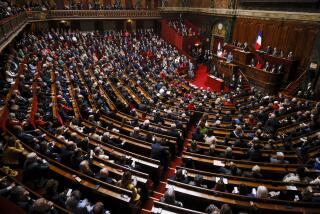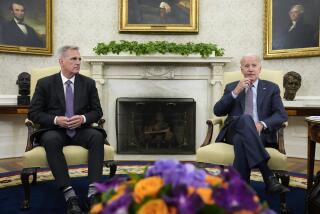In French Parliament, a Resounding ‘Oui’ for Accord : Legislation: Prime minister says Europe’s ‘cultural identity has been saved.’ Approval gives him a political boost.
- Share via
PARIS — French politicians overwhelmingly approved the new world trade agreement in Parliament here Wednesday, patting themselves on the back for exacting compromises from the Americans and preserving Europe’s cultural identity from Hollywood’s hegemony.
“The European cultural identity has been saved,” a relaxed Prime Minister Edouard Balladur told the Parliament in a speech interrupted by frequent applause. “French agriculture sees its future secure. And wisdom, in the end, prevailed.”
The accord, approved by a vote in Parliament of 466-90, was seen across this country as a French victory over a “formidable American propaganda machine” that had blamed earlier French objections on “backward farmers and filmmakers too mediocre to attract the public to their films,” as the daily newspaper Le Figaro put it.
The conservative paper, in a front-page editorial Wednesday, credited France with saving Europe’s interests in the global negotiations, conducted under the auspices of the General Agreement on Tariffs and Trade (GATT).
“This is a great success for France,” it said. “France’s partners (in Europe) had already given up the fight. It was our duty . . . to raise among other nations the courage to fight together for the survival of their identity.”
Parliament’s approval gave Balladur an important political boost. Although the vote was framed as a motion of confidence in Balladur’s government, the outcome in the chamber, which is controlled by Balladur’s party, was never in doubt.
But the prime minister succeeded in sharing political responsibility for an agreement that still is opposed by many of France’s more radical farmers.
In French eyes, though, Balladur’s most important achievement in the tense last-minute negotiations in Geneva was on the cultural front. Due largely to French objections, European and American negotiators were unable to reach an agreement on giving the U.S. entertainment industry greater access to European markets and to millions of dollars in disputed royalties.
France will still be able to keep an estimated $60 million annually in royalties, earned by U.S. producers, studios and production companies but used here to subsidize the French film industry. And left standing were European quotas for television programming, which limit the amount of a station’s programming that may come from outside the 12-nation European Community.
“We got what we wanted from the beginning,” said Alain Carignon, the French communications minister.
Jean-Jacques Beinex, one of France’s top film directors, said the negotiations “came very close to catastrophe. Now, we must get down to work, because the American lobbies won’t disarm.”
But even as the accord was being debated Wednesday, France’s theaters were doing brisk business with U.S. films. Seven of the top eight films in distribution were American, and the No. 1 hit, Walt Disney’s “Aladdin,” was outdrawing the most popular French film by a 6-to-1 margin.
Although the French generally adore American programs and films, they also believe strongly in the importance of protecting their own film industry, the only one in Europe that has not been buried by Hollywood’s mass-market movies.
But Balladur told his government ministers Wednesday that while they had won the first round, the battle over cultural trade is far from over. “We still will have to stay very vigilant,” he said.
For months, France, virtually alone in Europe, had objected to cutting subsidies for farmers and also demanded that cultural matters be exempt from the accord. Although subsidies for farmers are still likely to fall over time as a result of the agreement, France succeeded in obtaining important concessions from the Americans, who originally insisted on holding firm to a tentative farm agreement reached with Europe a year ago.
More to Read
Sign up for Essential California
The most important California stories and recommendations in your inbox every morning.
You may occasionally receive promotional content from the Los Angeles Times.











